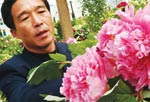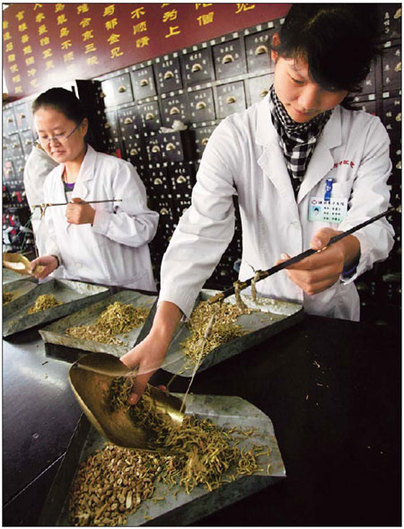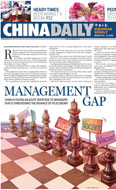Health
Back to our roots
Updated: 2011-03-09 08:01
(China Daily)
|
Traditional Chinese medicine offers a thorough solution, say its practitioners. Zhang Chi / for China Daily |
Traditional Chinese medicine is seeing a resurgence in Hong Kong, where it's thought Western medicine acts quickly but has more side effects.
"Big Snake Mak" has a secret weapon to fend off the threat of flu - it wriggles and hisses in a basket at his side.
Snakes have been used in China for thousands of years to cure a host of ailments - snake-fermented wine for arthritis, snake genitals for the kidneys and male sex drive, snake gall bladder for bronchitis.
And snake, says "Big Snake Mak" - otherwise known as serpent salesman Mak Tai-kwong - is a proven flu fighter.
"Those that eat snake bile four to five times every year will have a stronger body and much lower chances of contracting the flu," Mak says as he pulls a king cobra from his basket that he will kill, cook up and sell.
"Look at me, I'm over 80 but I rarely have the flu. It's because I eat snake regularly."
While not everyone would be inclined to follow Mak's lead, some in Hong Kong - a teeming city of 7 million - are turning away from the traditional flu jab in favor of Chinese herbal treatments.
Freelance photographer Vincent Du used Chinese medicine for chronic asthma as a child and reckons that herbal remedies keep the flu bug at bay - and ward off long-term illness.
"Western medicine takes effect faster but often has a lot of side effects," he says.
Bian Zhaoxiang, director of the Chinese medicine clinic at Hong Kong's Baptist University, says the number of flu patients at the clinic increased by 37 percent in the latter part of 2010 compared to the same period in 2009.
The university plans to build a HK$800 million ($100 million) teaching hospital that would provide the city's first in-patient Chinese medicine treatment.
"Chinese medicine is by far a better treatment for seasonal flu (compared to Western medicine), in terms of its effectiveness, side effects and symptom control," he says.
"In Chinese medicine, every patient will receive a personalized, tailor-made set of treatments specific to their body type."
Hong Kong is particularly nervous about infectious diseases, with at least 12 lives lost since the end of January to the deadly swine flu strain of the disease.
Dozens have been admitted to intensive care units with flu of some kind so far in 2011.
Officials from the city, which has some of the most densely packed neighborhoods in the world, have been nervous since the 2003 SARS virus outbreak that killed 300 people in Hong Kong and another 500 around the world.
There is little concrete evidence of Chinese medicine's effectiveness as a flu killer, but many in the city swear it works.
Chinese treatments involve using herbs such as powdered honeysuckle and forsythia, to keep the body's han (cold) and re (hot) energies in harmony - in addition to a healthy diet and acupuncture treatments.
Traditional remedies have been a crucial part of healthcare in China for thousands of years, and used for everything from disease prevention and treatment for diseases to relieving pain and soothing restlessness.
China's central government has urged citizens to use different herbal concoctions to beat the flu, and other ailments.
Even everyday foods like garlic, ginger, spring onion and vinegar can help ward off influenza, some say.
However, like some Western medicines, the Chinese variety have drawn criticism with questions swirling about the production facilities and manufacturing standards in Hong Kong.
Even the industry concedes about half the Chinese medicine sold in Hong Kong had not been tested for the presence of toxic materials such as heavy metals and pesticide residues.
In response, the city's government introduced new legislation in December, banning all unregistered proprietary Chinese medicine with a maximum fine of HK$10,000 and two years in jail.
The move sparked anger among many Chinese medicine practitioners, but there seems little doubt Hong Kong residents will keep using traditional remedies despite the new regulations.
"Many youngsters nowadays turn to Chinese medicine," says Qiu Hong-zhen, a shopkeeper at a pharmacy that sells both Chinese and Western medicine.
"Western medicines are mostly for those looking for a quick fix, but it does not get to the root of the problem - Chinese medicine is a thorough solution."
Agence France-Presse
E-paper

Rise and shine
The Chinese solar energy industry is heating up following recent setbacks in the nuclear sector
Bombs aim for regime change
CSI, with a twist
Literary path
Specials

Peony express
Growers of china's unofficial national flower are reaching out to europe for help

Tea-ing up
More turning to Chinese tea for investment opportunities like vintage wine

A cut above
The ancient city of Luoyang is home to a treasure trove of cultural wonders.

